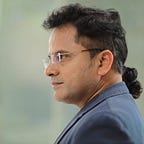Digital Economy — Schumpeter’s ‘creative destruction’ in disguise!
The history of the world has it that economic might has universally beaten military might across wars across centuries. Will this massive change of democratisation of economic opportunity through crowd-based capitalism even lead to evolution of a better political system of governance.
Majority of populations around the world work for a few others and the model of full-time employment is as accepted in the society today as other established institutions like marriage, family, etc. A thousand years ago, it was considered detestable — almost akin to bondage. Today, full-time employment is a respectable thing to do in most parts of the world. The employment model has today been refined to include worker protections, benefits and the works.
The same is on the verge of being challenged however.
Crowd-based economic model
You-tube and eBay were the pioneers of the first instance of a crowd-based economic model. And now it’s becoming personal! Today Uber (ride hailing) and Air b-n-b (room sharing) are the poster boys of a glamorous new way of economic modelling popularly called ‘sharing economy’. Who would not have laughed off a decade ago on the prospect of the extent of intrusion with people around the world willing to ‘share a bedroom’ to make the most of a gig economy.
Platform based disruptions
Platform based disruptions across industries — enabled through an overall robust digital trust network (example — online profiles of hosts and guests, rating systems, etc) in the ecosystem — is becoming the order of the day. Is it the transformation of good old capitalism — the defining economic force of the 20th century.
Historically, employment as a method has seen unprecedented success as a model to organise labor over the last few hundred years. Will we see the 21st century lend itself to organising labor in a different fashion ultimately leading to end of full-time employment as a core model as we know it.
The sharing economy basically relies on its ability to use resources optimally to give best throughput and is seemingly a more efficient, productive and better system. I am convinced that ‘sharing’ could be a force for good but may not necessarily replace good old ‘full-time employment’ as a core model anytime soon.
Schumpeter’s ‘creative destruction’ in disguise?
The history of the world has it that economic might has universally beaten military might across wars across centuries. Will this massive change of democratisation of economic opportunity through crowd-based capitalism even lead to evolution of a better political system of governance.
Then there are more ‘human’ issues. A job is just not income. It is dignity, hope and purpose. Philosophers have long debated that work is an essential endeavour to a meaningful life. 20th century management theory also came of age with Theory Y and Theory Z arguing that man basically wants to work. How does the future of work look like?
Can ‘new economy’ work for everybody? Will it succeed in universally becoming the new normal? Can it be inclusive as it purportedly seems to be and contentiously fights to project? Is the gig economy Schumpeter’s ‘creative destruction’ in disguise or is this disruption only going to be replacing a rusty nail with a crooked one!
Is the digital economy then a silent time-bomb signifying the beginning of the end of employment.
Are we fortunate to be living in interesting and exciting times that saw the early days of unravelling of future of work! The world is becoming a faster changing and more turbulent place for organisations and the ability to adapt has never been greater.
Vulnerability for all — people and institutions alike — is the absolute heartbeat of this emerging future. The big question for new economy is not what reward we get for being a participant but what we become by it.
Originally published at http://www.digitalmarket.asia on July 14, 2017.
